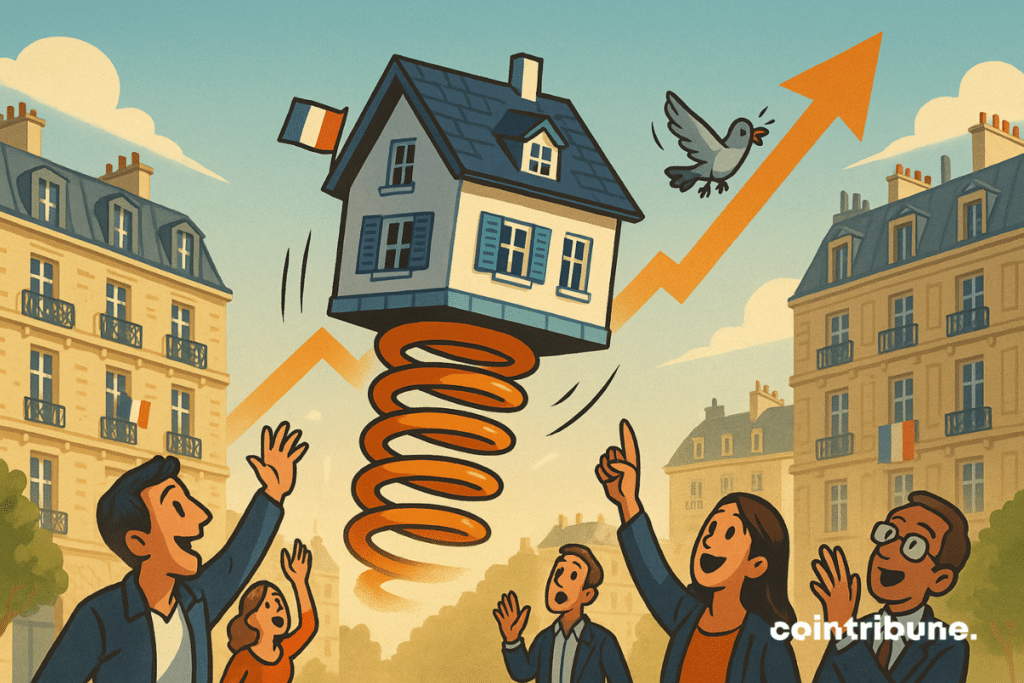Real Estate Market Roars Back—2025 Sees Transactions Spike Like a Memecoin
Bricks-and-mortar suddenly hot again—turns out people still need roofs, not just metaverse plots.
The Numbers Don’t Lie (For Once)
Q1 2025 transactions ripped past last year’s figures—no ’slow season’ this time. Agents are suddenly wearing Rolexes ironically again.
Why Now? Blame the Rate Cuts
The Fed’s pivot sent traditional investors scrambling—turns out 5% yields on boring assets beat vaporware NFTs after all. Who knew?
The Cynic’s Corner
Watch institutional money flood in now that returns are guaranteed. Just like crypto—but with zoning laws and fewer rug pulls.

In Brief
- After a year and a half of continuous decline, real estate prices in France recorded an increase of +0.5 % in the first quarter of 2025.
- Transaction volumes are also increasing, with 880,000 sales over 12 months, a sign of renewed activity in the market.
- The return of demand, fueled by improved real estate purchasing power, is driving prices up, especially for apartments.
- Projections forecast a continued increase by July, but this trend remains fragile and dependent on the macroeconomic context.
The price reversal officially confirmed
In many French cities, real estate prices are rising again, marking a significant trend change after a long period of decline. It is now official: the French real estate market is beginning a rebound after six consecutive quarters of decline.
The Notaries-Insee index, a benchmark in the field, recorded a 0.5 % annual increase in prices for old real estate in France in the first quarter of 2025, the first in a year and a half. At the same time, transaction volumes have shown a sharp recovery.
“880,000 sales were recorded over the rolling twelve months ending March 2025, compared to 845,000 at the end of December 2024 and 832,000 in September,” details the official note. This simultaneous flicker in prices and transactions constitutes an important signal for a market so far stagnant in France.
However, territorial and typological dynamics reveal an uneven recovery. Here are the main insights drawn from Notaries-Insee data and expert statements:
- In the provinces : prices increase on average by +0.7 % year-on-year. Apartments drive the trend with +1.1 %, versus +0.5 % for houses.
- In Île-de-France: a moderate annual price decline (-0.3 %), but a notable quarterly increase (+0.9 % between Q4 2024 and Q1 2025). The rise is almost nil for apartments (+0.1 %), but a marked decline in houses (-1.1 %) is observed.
- In Paris: disparities between neighborhoods are significant: “the center of Paris experiences a greater price decrease than the rest of the capital. A 7 % drop is seen in central Paris versus a 4 % increase in the 8th arrondissement,” specifies Anne Cuvelier-Hutin, notary in Gagny.
These early signs of recovery, although modest, mark a symbolic turning point. The market remains fragmented, however. Some areas in France are beginning to rise, others continue to decline, revealing a real estate landscape now more complex than a simple linear upward return.
The invisible levers behind the recovery
Behind this measured recovery lies a decisive variable: the evolution of interest rates. After peaking at 4.2 %, mortgage rates have fallen back to just over 3% within 18 months.
This easing has allowed a portion of households, previously excluded from the market, to regain sufficient purchasing power to consider buying. A rate drop mechanically restores borrowing capacity and boosts demand.
This recovery dynamic is therefore as much psychological as economic: buyers, less anxious about financing, are gradually re-entering the market.
However, this recovery remains fragile. The pace of the increase is still moderate and the market fundamentals remain uncertain. Opposite regional trends, cautious banks, and energy regulations (DPE, thermal sieves) continue to slow momentum.
“A price increase movement should emerge by July. Apartment prices could rise to 3.2 %,” estimates Elodie Frémont, president of the Real Estate Statistics Commission.
These forecasts, although optimistic, remain conditioned on a macroeconomic stability that is hard to guarantee. In short, the current recovery could turn into a boom… or fade away if rates rise again.
In this context of reshuffling, real estate tokenization also emerges as a path to explore by crypto investors. By allowing investment in fractions of properties via blockchain, it opens access to projects previously reserved for institutional players, while bringing liquidity and transparency to individuals.
The prospects remain open. If the trend is confirmed in the coming quarters, the impact will be considerable on investment strategies, including for crypto actors seeking real estate exposure in decentralized finance or real estate tokens. However, if this increase proves to be only a technical rebound, prices could again align with a downward trajectory.
Maximize your Cointribune experience with our "Read to Earn" program! For every article you read, earn points and access exclusive rewards. Sign up now and start earning benefits.

